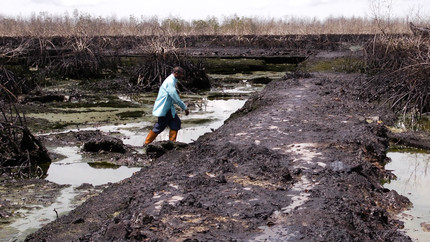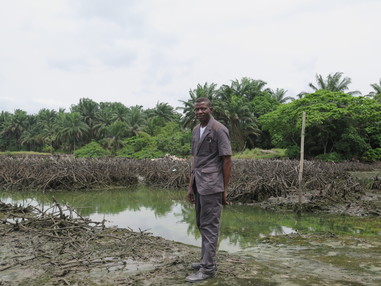Compiled by Atâyi Babs

“Oil pollution in the Niger Delta destroys livelihoods”
“Shell. Own up. Pay up. Clean up.”
Image is of Pastor Christian Lekoya Kpandei showing the damage done to his fish farm in Bodo, Nigeria, May 2011. The farm flourished before the August 2008 oil spill, but the pollution destroyed his fish farm, leaving him and his workers without a regular income. Bodo, Nigeria, May 2011. (PHOTO: Amnesty International)



Independent experts estimate that more than 4,000 barrels of oil were spilled every day before the pipe was clamped. The oil killed much of the fish and shellfish in the creek. (PHOTO: CEHRD)

This still image taken from the film shot by local NGO, Centre for Environment, Human Rights and Development (CEHRD).
On 28 August 2008 a fault in the Trans-Niger pipeline resulted in a significant oil spill into Bodo Creek in Ogoniland. The oil poured into the swamp and creek for weeks, covering the area in a thick slick of oil and killing the fish that people depend on for food and for their livelihood.
Thousands of barrels of oil spouted out of the broken pipeline for 10 weeks before Shell finally clamped it on 7 November 2008.
According to Shell, a total of 1,640 barrels of oil were spilled during the first spill. An independent assessment suggests that some 4,000 barrels poured out every day. (PHOTO: CEHRD)



Celicia and Emmanuel are married and have a daughter and son. Emmanuel is a fisherman. Cecilia collected shell fish. Because of the Shell oil spill of 2008, they now have to go much further to be able to fish. It means that they can’t catch as much fish as they used to. (PHOTO: Amnesty International)

by













Don’t know where to start,so so sad! Haven spent 25yrs in Warri I can’t but feel this pain. Something must be done abd urgently, things can’t continue like this!!